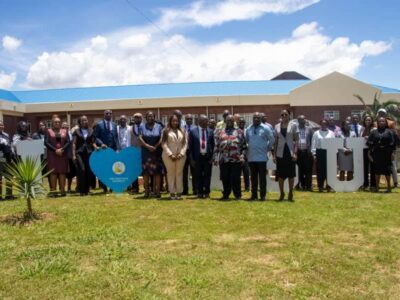The French Ambassador to Zimbabwe, His Excellency Mr. Paul-Bertrand Barets, officially handed over a cutting-edge biotechnology centre to the University of Zimbabwe during the 6th innovation week. The laboratory will empower Zimbabwe in enhancing its ability to swiftly detect and respond to disease outbreaks, monitor disease circulation, produce local knowledge, and collaborate with global networks for disease surveillance.
The ceremony, held yesterday, signalled the deepening cooperation between France and Zimbabwe in advancing research, disease control, and innovation under the One Health framework.
By Gamuchirai Mapako
The handover of the biotechnology centre, established under the PACMAN project (Prevention and Control of Animal Diseases), represents a significant leap forward for Zimbabwe’s capacity to combat zoonotic and animal diseases. Funded by the French government to the tune of nearly €2 million, the facility is equipped with state-of-the-art molecular and serological diagnostic tools, positioning Zimbabwe as a regional leader in disease surveillance and research.
Ambassador Barets, in his keynote address, hailed the project as a testament to the power of international collaboration.
“This ceremony is not just the conclusion of a project—it is the beginning of a new chapter,” he added
“A chapter in which Zimbabwe strengthens its ability to respond to animal and zoonotic diseases autonomy, scientific rigour, and world-class infrastructure.”
The event was graced by high-profile dignitaries, including Professor Paul Mavima, Acting Minister of Higher and Tertiary Education, Science, Innovation and Technology Development, and Professor Paul Mapfumo, Vice Chancellor of the University of Zimbabwe. Also in attendance were representatives from the French agricultural research and development institutions CIRAD and IRD, the RP-PCP network, and members of the diplomatic corps.
Initiated in 2019, the PACMAN project was designed to bolster Zimbabwe’s diagnostic and research capabilities in the face of emerging infectious diseases. The French government’s initial investment of €850,000 laid the groundwork for training, laboratory establishment, and research projects. By 2021, the French Agency for Development (AFD) expanded this vision, injecting an additional €2 million to create a fully equipped biomolecular laboratory.
The project has delivered tangible outcomes which included the transformation of a building into a high-standard biotechnology facility compliant with international biosafety norms.
Over 308 professionals from public institutions, universities, and the private sector were also trained under the project, given the opportunity to train in France. The PACMAN Project has also afforded Master’s and PhD students academic advancement support.
In his speech, the Ambassador underscored the urgency of adopting a One Health approach which is an integrated strategy addressing the interconnectedness of human, animal, and environmental health.
“In today’s interconnected world, we are all aware that the threats we face are increasingly complex,: he noted
“Covid crisis, climate change, habitat loss, global trade and mobility these factors are amplifying the emergence of infectious diseases at the human-animal-environment interface. In this context, the concept of One Health is no longer optional, it is essential.”
The PACMAN project which Ambassador Barets described as “co-owned, co-developed, and co-managed” by all stakeholders, including the University of Zimbabwe, the Department of Veterinary Services, CIRAD, IRD, and the RP-PCP network was also praised by Professor Paul Mavima, Acting Minister of Higher and Tertiary Education, Science, Innovation and Technology Development, who during a side interview, praised the initiative for having the potential to revive the Zimbabwean pharmaceutical industry.
France’s commitment to Zimbabwe extends beyond financial support. CIRAD and IRD have maintained a presence in the country for over 30 years, working alongside local partners to cultivate a culture of scientific excellence. The Ambassador praised Zimbabwe’s Ministry of Higher and Tertiary Education for its leadership in integrating science, technology, and higher education, creating an enabling environment for projects like PACMAN to thrive.
The laboratory is already attracting interest from prestigious institutions like the Institut Pasteur, the University of Liège, and South Africa’s National Institute for Communicable Diseases, signalling its potential as a hub for regional and global partnerships.














Comments